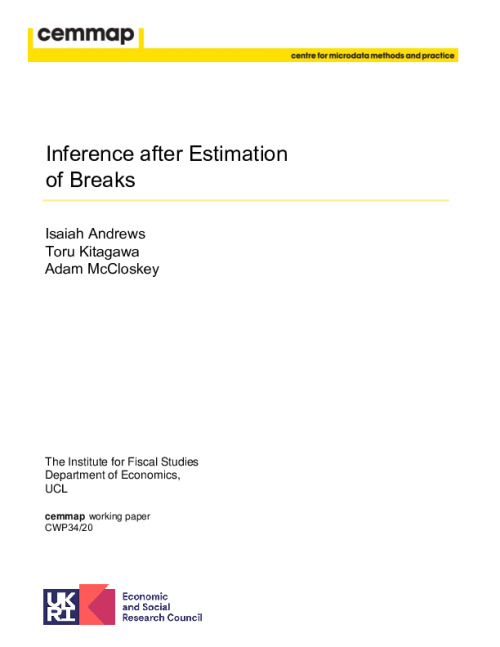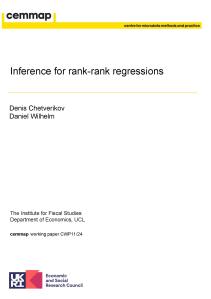Downloads

CWP3420-Inference-after-Estimation-of-Breaks.pdf
PDF | 977.7 KB
In an important class of econometric problems, researchers select a target parameter by maximizing the Euclidean norm of a data-dependent vector. Examples that can be cast into this frame include threshold regression models with estimated thresholds and structural break models with estimated breakdates. Estimation and inference procedures that ignore the randomness of the target parameter can be severely biased and misleading when this randomness is non-negligible. This paper studies conditional and unconditional inference in such settings, accounting for the data-dependent choice of target parameters. We detail the construction of quantile-unbiased estimators and confidence sets with correct coverage, and prove their asymptotic validity under data generating process such that the target parameter remains random in the limit. We also provide a novel sample splitting approach that improves on conventional split-sample inference.
Authors

Research Associate University College London and Brown University
Toru is a Research Associate of the IFS, a Professor of Economics at UCL and an Associate Professor in the Department of Economics at Brown University

Isaiah Andrews

Adam McCloskey
Working Paper details
- DOI
- 10.1920/wp.cem.2020.3420
- Publisher
- The IFS
Suggested citation
I, Andrews and T, Kitagawa and A, McCloskey. (2020). Inference after Estimation of Breaks. London: The IFS. Available at: https://ifs.org.uk/publications/inference-after-estimation-breaks-0 (accessed: 30 June 2024).
More from IFS
Understand this issue

Gender norms, violence and adolescent girls’ trajectories: Evidence from India
24 October 2022

What are the challenges in getting debt on a falling path?
28 June 2024

Election Special: Your questions answered
27 June 2024
Policy analysis

IFS Deputy Director Carl Emmerson appointed to the UK Statistics Authority Methodological Assurance Review Panel
14 April 2023

ABC of SV: Limited Information Likelihood Inference in Stochastic Volatility Jump-Diffusion Models
We develop novel methods for estimation and filtering of continuous-time models with stochastic volatility and jumps using so-called Approximate Bayesian Compu- tation which build likelihoods based on limited information.
12 August 2014

Is there really an NHS productivity crisis?
17 November 2023
Academic research

Inference for rank-rank regressions
28 May 2024

Sample composition and representativeness on Understanding Society
2 February 2024

The impact of labour demand shocks when occupational labour supplies are heterogeneous
28 June 2024